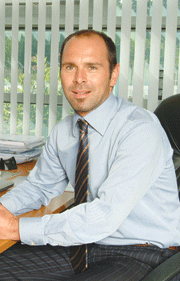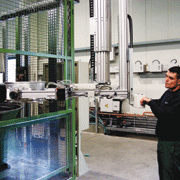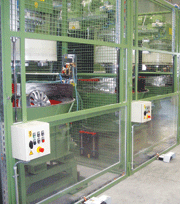E-Archive
Articles
in Vol. 7 - March Issue - Year 2006
The Shiny Way - Polishing of Alloy Wheels

Author: Dirk Gather, Project Management

Polished wheels

New handling system

Production line
The demand for a safe wheel polishing process ready to go into mass production is increasing rapidly. The automotive industry expects fully developed solutions. These solutions were not available until 2004. As an alternative to traditional silver coated or decorative chrome surfaces the newly developed polishing process of R² Wheel Finishing is becoming more and more widely accepted. Due to technical and economic reasons the technology of R² offers convincing advantages.
One year ago in this place we reported about the development of an automated process for grinding and polishing alloy wheels.
In 2003 the development had reached the point where we could build the first line for serial production.
But that was just the starting signal for the improvement of machine and process technology that has to be continued to fulfil the demands of the expanding market.
The first contracts for serial production had been closed and at the same time the complete technology had been on trial to define the necessary steps for further increasing of the quality level. But why that? The demands of the automotive industry consist of more than just a decorative surface. They expect among other things:
-Maximum process safety
-Availability of short-term, medium-term and long-term capacities
-Fulfilment of all quality standards (for example Cass-Test)
-Continuous process improvement
To meet the industries requirements, R² and Rösler as constructor and supplier of machine and consumables started a project-team to improve machine and process. After just a few months and a large number of tests and trials successful results had been reached. A list of different steps was drawn up and the work started in the second half of 2005. Due to the very fast implementation in January 2006 the next generation of the Rösler wheel finishing machine type TS-01 in connection with optimized process parameters could be installed at R².
The Development in Detail
-Modification of the machine:
Due to an additional engine unit the movements of the wheel into the process (turning, lifting, falling, rotating) can be controlled independent from each other. So the movement can be adjusted to the different wheel geometries in a more effective way. Due to that improvement the range of treatable wheels will be increased noticeable. Also complicated wheel designs with narrow spokes or deep windows between the spokes can be successfully polished now.
Due to the modified movement a very smooth surface structure on the wheels can be reached. Depending on the roughness and the cast quality of the raw wheel, this new process produces surfaces, which in earlier times just could be reached by using manual or robot-polishing.
-Improvement of grinding and polishing media:
The two step pre-grinding process at the treatment of cast or forge alloy wheels has been established as the optimum treatment to get a surface structure ready for the final polishing procedure.
The most important quality aspects come out of the right choice of suitable grinding media. (ceramic or plastic media of different sizes, geometries and abrasivity)
The Rösler R&D-department can successfully create a brand new generation of plastic media especially for the treatment of high quality aluminium surfaces. The optimum combination of intensive abrasive but at the same time careful treatment as well as the arrangement of several different geometries could cause a nearly 25 percent better polishing result.
The sum of improvements demonstrated a positive difference in quality, so an implementation of the serial production of R² was quickly decided on. Six months later the modified machine was constructed and built up. In October 2005 the first prototype was installed at the test center of R² to optimize the details. All the results of the following test series were directly utilized for the running machine production at Rösler.
Following the new technology, in January 2006 the first production line was delivered to R². The start of production is planned for March 2006. The existing machines of 2004/2005 will be rebuilt as the next step. That means from April 2006 an available capacity of about 10.000 wheels per month.
R² offers the wheel finishing technology as sub contractor or as machine/process supplier for interested wheel manufacturers.
The head quarters at Oranienburg / Germany (close to Berlin) offers the chance to receive any information about the technology.
Thanks to the quality improvement R² is able to present an attractive alternative to the particular wheel market, high process safety and many ways to integrate the technology into the production flow should make sure a successful future for that process.
For Information:
R² Felgenveredelung GmbH
Am Gleis 3, 16515 Oranienburg, Germany
Tel. +49.3301.5232.0 Fax +49.3301.5232.29
E-mail: dirk.gather@r2-felgen.de
www.r2-felgen.de



























